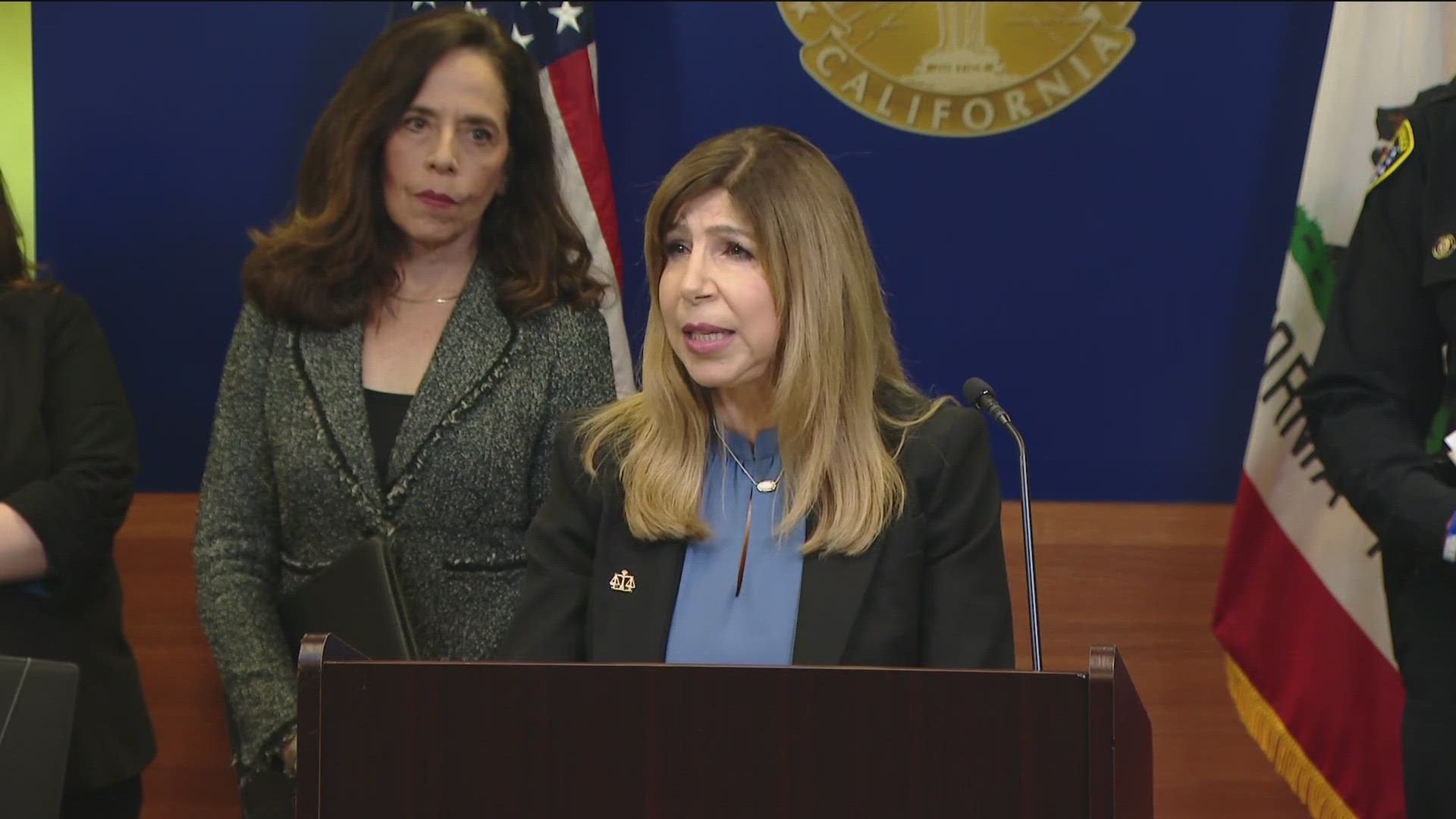SACRAMENTO, Calif. — In California elections, it’s practically tradition.
About 100 days before the election, the state attorney general writes up a label and succinct summary of each ballot proposition. And then, like clockwork, pro- and anti-camps spend the next 20 days feverishly filing lawsuits. Their goal: convince judges, before the ballot goes to print, that the attorney general has linguistically tilted the playing field against them.
This year has been more of the same — only more so.
Over the last two weeks, Attorney General Xavier Becerra has been sued six times for the way he has labeled and summarized some of this year’s most contentious ballot measures. That’s a modern record. No election cycle has seen more proposition summary battles since at least 2008, according to a CalMatters review of court filings.
But despite the surge, state courts continue to defer to the attorney general’s choice of verbiage. And that’s sharpening critics’ demands that California transfer at least some of the task of describing ballot measures to more objective, nonpartisan hands — as Utah, Michigan and the city of San Francisco do.
“I’m hoping the courts will come in and do something,” said John Matsusaka, Executive Director of Initiative and Referendum Institute at the University of Southern California. “If not I’m sure we’ll have a more serious conversation about having a nonpartisan entity do this.”
Thus far, the courts haven’t been inclined to intervene. In three tentative rulings this week, Sacramento Superior Court Judge Laurie Earl announced her intention to slap down half the current lawsuits against Becerra.
“The Court is not a copy editor,” she wrote.
Such challenges are an “uphill battle,” said Bradley Hertz, an election lawyer with Sutton Law Firm. But he said this week’s rulings make that climb even steeper:
“The fact that lawsuits challenging (Becerra’s) descriptions of 2020 ballot measures are going down in flames is sure to serve as a strong deterrent to those who might wage similar challenges in 2022 and beyond.”
What’s printed on the ballot provides the last and, for some voters, the only impression of what a “yes” or a “no” vote on a proposition actually means. That makes the 75-word prop label on the ballot, along with the title and summary in the state election guide, some of the most fiercely litigated text in California’s political universe.
“A lot of people don’t know how much thought and analysis and sometimes litigation go into what they ultimately see on the ballot,” said Hertz, who has challenged the attorney general’s ballot description in prior elections.
California election law requires those descriptions and labels to be “true and impartial” and “neither be an argument, nor be likely to create prejudice, for or against the proposed measure.” But that same section of the law tasks that writing job with a partisan, elected official, the attorney general.
The inevitable result: a flurry of lawsuits filed every election season, with proponents and opponents of various ballot measures claiming the attorney general is putting his or her ideological or electoral interests over fairness.
Pre-election polling from the 2018 election shows how ballot wording can prime voters in one direction or another.
When likely voters were asked by pollsters at the Public Policy Institute of California whether they supported repealing a 2017 gas tax increase, 50% said that they did. But when other likely voters were shown the ballot language of Prop. 6, a measure to repeal that same tax increase but described as an initiative that “Eliminates Certain Road Repair and Transportation Funding,” support dropped to 39%.
The language of Prop. 6 was challenged in court. But an appellate court struck that down, writing that ballot descriptions “prepared by the Attorney General must be upheld because all legitimate presumptions should be indulged in favor of the propriety of the attorney-general’s actions.” That ruling was cited extensively by Judge Earl in her tentative judgments this week.
This year’s surplus of litigation may simply reflect just how contentious some of the measures on this year’s ballot are.
Proposition 15, for example, would be a historically large hike in property taxes for big commercial properties. No surprise then that Becerra has been sued by both business groups and anti-tax advocates over his description of the measure, which emphasizes that it “increases funding sources for public schools” without specifically including the phrase “tax increase.”
Likewise, Prop. 22 would classify gig-economy workers as independent contractors, exempting them from standard minimum wage and hour regulation. The business models of Uber, Lyft and Doordash are counting on its passage. Becerra was sued over his label to that one too. The attorney general wrote that the proposition “exempts app-based transportation and delivery companies from providing employee benefits to certain drivers,” a description that proponents said was “infected with the contagion of bias and hostility.”
Courts have a long history of being “very deferential” to the attorney general, said Christopher Elmendorf, a law professor at UC Davis. As far back as 1938, the state Supreme Court wrote that “if reasonable minds may differ as to the sufficiency of the title, the title should be held to be sufficient.”
That deference is baked into the state election code, which says that courts should second-guess the attorney general “only upon clear and convincing proof that the material in question is false, misleading, or inconsistent” with the law.
Judge Earl took a similar tact this week. In response to the petition from Jon Coupal, president of the Howard Jarvis Taxpayers Association, which opposes Prop. 15, Earl wrote that while one portion of the title “may be somewhat misleading, the Court is not convinced the sentence is so misleading that it justifies judicial intervention.”
In other words, in all but the clearest cases of bias or inaccuracy, the court gives the attorney general the benefit of the doubt.
Many newspaper editorial boards this year have not. In recent weeks, editorials from the Los Angeles Times, the San Francisco Chronicle and the San Jose Mercury News have alternately accused Becerra of “playing favorites,” “skewing the language” of the ballot and “(t)ricking the electorate.”
Late last month, the board of the San Diego Union-Tribune argued that “California needs to take this job away from Attorney General Xavier Becerra ASAP.”
There is some precedent for doing so, though not much of one.
In Utah, the nonpartisan Office of Legislative Research and General Counsel pens each ballot measure’s title, but it is reviewed by the partisan office of lieutenant governor. In Michigan, the bipartisan Board of State Canvassers gets the final say for both the title and summary, but only after the state’s elections director, a political appointee, writes the first draft.
The closest example of nonpartisan initiative summarizing comes from San Francisco, where a “Ballot Simplification Committee” is given the job. A group of five volunteers is tasked with writing quick summaries at an “eighth-grade reading level.” Three are appointed by professional organizations of journalists and the local League of Women Voters. The remaining two are appointed by the mayor.
Assemblymember Kevin Kiley, a Rocklin Republican, has floated a constitutional amendment that would hand the job of summarizing statewide initiatives to the nonpartisan Legislative Analyst’s Office, which already writes fiscal analyses for initiatives. The proposal died without a hearing.
But even that purportedly disinterested body of fiscal wonkitude is not free of suspicion. In their lawsuit against Becerra, supporters of Prop. 22, the gig economy initiative, sued the Analyst’s Office too. Judge Earl tentatively dismissed those claims as well.
The courts have until August 10 to address the various challenges before ballots and voter pamphlets go to the printers. That’s also the deadline to resolve at least four other examples of linguistic litigation — in those cases, one side accuses the other of submitting misleading ballot arguments for use in the state voter information guide.



